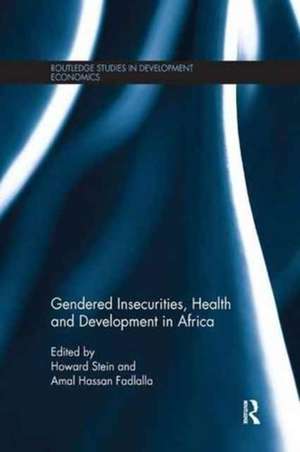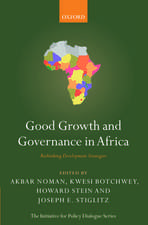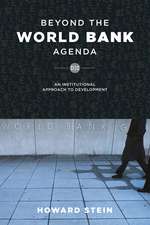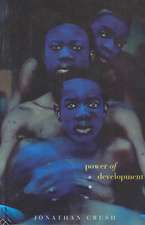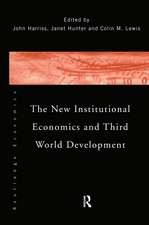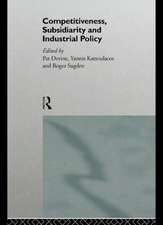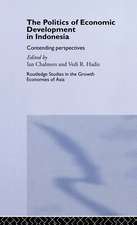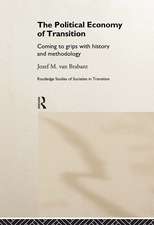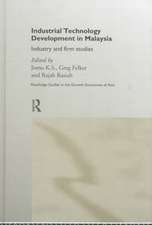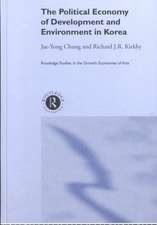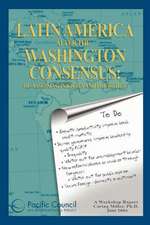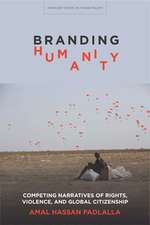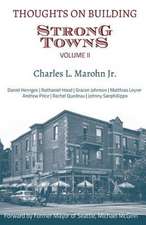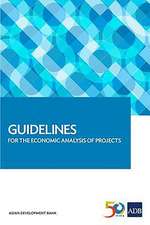Gendered Insecurities, Health and Development in Africa: Routledge Studies in Development Economics
Editat de Howard Stein, Amal Fadlallaen Limba Engleză Paperback – 8 noi 2016
Since its introduction in the 1994 UNDP Human Development report, the idea of human security has become increasingly influential among academics and international development practitioners. However, gendered dimensions of human security have not attracted enough attention, despite their vital importance. Women are disproportionately more vulnerable to disease and other forms of human insecurity due to differences in entitlement, empowerment and an array of other ecological and socio-economic factors. These gendered insecurities are inextricably linked to poverty, and as a result, the feminization of poverty is a growing phenomenon worldwide. The contributors to this volume rely on a gender-focused analysis to consider a number of issues central to human security and development in Africa, including food security, environmental health risks, discrimination within judicial and legal systems, gendered aspects of HIV/AIDS transmission and treatment technologies, neoliberalism and poverty alleviation strategies, and conflict and women’s political activism.
The gender focus of this volume points to the importance of power relationships and policy variability underlying human insecurities in the African context. The insights of this book offer the potential for an improved human security framework, one that embraces a more complex and context-specific analysis of the issues of risk and vulnerability, therefore expanding the capacities of the human security framework to safeguard the livelihoods of the most vulnerable populations.
| Toate formatele și edițiile | Preț | Express |
|---|---|---|
| Paperback (1) | 483.49 lei 6-8 săpt. | |
| Taylor & Francis – 8 noi 2016 | 483.49 lei 6-8 săpt. | |
| Hardback (1) | 1058.79 lei 6-8 săpt. | |
| Taylor & Francis – 14 iun 2012 | 1058.79 lei 6-8 săpt. |
Din seria Routledge Studies in Development Economics
-
 Preț: 309.74 lei
Preț: 309.74 lei -
 Preț: 327.17 lei
Preț: 327.17 lei -
 Preț: 326.49 lei
Preț: 326.49 lei -
 Preț: 311.41 lei
Preț: 311.41 lei -
 Preț: 394.38 lei
Preț: 394.38 lei - 8%
 Preț: 396.85 lei
Preț: 396.85 lei -
 Preț: 268.36 lei
Preț: 268.36 lei - 18%
 Preț: 1165.24 lei
Preț: 1165.24 lei - 15%
 Preț: 470.31 lei
Preț: 470.31 lei - 18%
 Preț: 1057.05 lei
Preț: 1057.05 lei - 18%
 Preț: 1225.29 lei
Preț: 1225.29 lei - 18%
 Preț: 1113.63 lei
Preț: 1113.63 lei - 18%
 Preț: 1300.62 lei
Preț: 1300.62 lei - 28%
 Preț: 878.42 lei
Preț: 878.42 lei - 18%
 Preț: 1166.05 lei
Preț: 1166.05 lei - 18%
 Preț: 1059.45 lei
Preț: 1059.45 lei -
 Preț: 381.11 lei
Preț: 381.11 lei - 28%
 Preț: 823.63 lei
Preț: 823.63 lei - 25%
 Preț: 361.84 lei
Preț: 361.84 lei - 20%
 Preț: 274.01 lei
Preț: 274.01 lei - 18%
 Preț: 1060.87 lei
Preț: 1060.87 lei - 18%
 Preț: 1168.85 lei
Preț: 1168.85 lei - 18%
 Preț: 1171.89 lei
Preț: 1171.89 lei - 18%
 Preț: 1068.18 lei
Preț: 1068.18 lei - 18%
 Preț: 1060.19 lei
Preț: 1060.19 lei - 18%
 Preț: 1341.98 lei
Preț: 1341.98 lei - 18%
 Preț: 1169.16 lei
Preț: 1169.16 lei - 18%
 Preț: 1057.05 lei
Preț: 1057.05 lei - 15%
 Preț: 708.81 lei
Preț: 708.81 lei - 18%
 Preț: 1287.06 lei
Preț: 1287.06 lei - 18%
 Preț: 1124.73 lei
Preț: 1124.73 lei - 18%
 Preț: 1157.34 lei
Preț: 1157.34 lei - 27%
 Preț: 832.80 lei
Preț: 832.80 lei - 28%
 Preț: 850.91 lei
Preț: 850.91 lei - 18%
 Preț: 1066.79 lei
Preț: 1066.79 lei - 28%
 Preț: 658.19 lei
Preț: 658.19 lei - 28%
 Preț: 992.79 lei
Preț: 992.79 lei - 18%
 Preț: 1069.23 lei
Preț: 1069.23 lei - 15%
 Preț: 703.08 lei
Preț: 703.08 lei -
 Preț: 395.63 lei
Preț: 395.63 lei - 18%
 Preț: 706.91 lei
Preț: 706.91 lei -
 Preț: 419.92 lei
Preț: 419.92 lei - 18%
 Preț: 1055.38 lei
Preț: 1055.38 lei - 27%
 Preț: 993.85 lei
Preț: 993.85 lei - 18%
 Preț: 707.10 lei
Preț: 707.10 lei -
 Preț: 409.19 lei
Preț: 409.19 lei
Preț: 483.49 lei
Nou
Puncte Express: 725
Preț estimativ în valută:
92.52€ • 100.90$ • 78.01£
92.52€ • 100.90$ • 78.01£
Carte tipărită la comandă
Livrare economică 24 aprilie-08 mai
Preluare comenzi: 021 569.72.76
Specificații
ISBN-13: 9781138224971
ISBN-10: 1138224979
Pagini: 224
Ilustrații: 10
Dimensiuni: 156 x 234 mm
Greutate: 0.32 kg
Ediția:1
Editura: Taylor & Francis
Colecția Routledge
Seria Routledge Studies in Development Economics
Locul publicării:Oxford, United Kingdom
ISBN-10: 1138224979
Pagini: 224
Ilustrații: 10
Dimensiuni: 156 x 234 mm
Greutate: 0.32 kg
Ediția:1
Editura: Taylor & Francis
Colecția Routledge
Seria Routledge Studies in Development Economics
Locul publicării:Oxford, United Kingdom
Public țintă
Postgraduate and UndergraduateCuprins
Introduction 1. The Gender Context of Vulnerability to HIV/AIDS: The Case of Men and Women in Low Socioeconomic Areas of the City of Lilongwe in Malawi Ezekiel Kalipeni and Jayati Ghosh 2. Treating AIDS in Uganda and South Africa: Semi-Authoritarian Technologies in Gendered Contexts of Insecurity Lisa Ann Richey 3. Whose Human Security? Gender, Neoliberalism and The Informal Economy in Sub-Saharan Africa Zo Randriamaro 4. African Poverty, Gender and Insecurity John Weeks and Howard Stein 5. Food Crises: The Impact on African Women and Children Meredeth Turshen 6. Gender, Environment and Human Security in the Greater Accra Metropolitan Area (GAMA), Ghana Jacob Songsore 7. Negotiating Security: Gender, Violence, and the Rule of Law in Post-War South Sudan Jok Madut Jok 8. Gender, Agency, and Peace Negotiations in Africa Aili Mari Tripp
Notă biografică
Howard Stein is Professor in the Department of Afroamerican and African Studies (DAAS) and also teaches in the Department of Epidemiology at the University of Michigan. His research has focused on foreign aid, finance and development, structural adjustment, health and development, industrial policy and rural property rights transformation.
Amal Hassan Fadlalla is Associate Professor of Anthropology, Women’s Studies and African Studies at the University of Michigan. Her teaching addresses global perspectives on gender, health, and reproduction, and gender, diaspora and transnationalism.
Amal Hassan Fadlalla is Associate Professor of Anthropology, Women’s Studies and African Studies at the University of Michigan. Her teaching addresses global perspectives on gender, health, and reproduction, and gender, diaspora and transnationalism.
Descriere
This book considers gender dimensions of a number of issues central to human security and development in Africa, including food security, AIDS, legal rights, violence, conflict resolution, informal work, the environment, and poverty alleviation.
The gender focus of this volume points to the importance of power relationships and policy variability underlying human insecurities in the African context. The insights of this book offer the potential for an improved human security framework, one that embraces a more complex and context-specific analysis of the issues of risk and vulnerability, therefore expanding its capacity to safeguard the livelihoods of the most vulnerable populations.
The gender focus of this volume points to the importance of power relationships and policy variability underlying human insecurities in the African context. The insights of this book offer the potential for an improved human security framework, one that embraces a more complex and context-specific analysis of the issues of risk and vulnerability, therefore expanding its capacity to safeguard the livelihoods of the most vulnerable populations.
